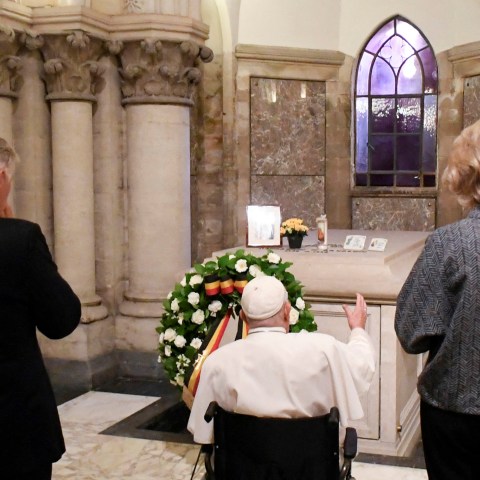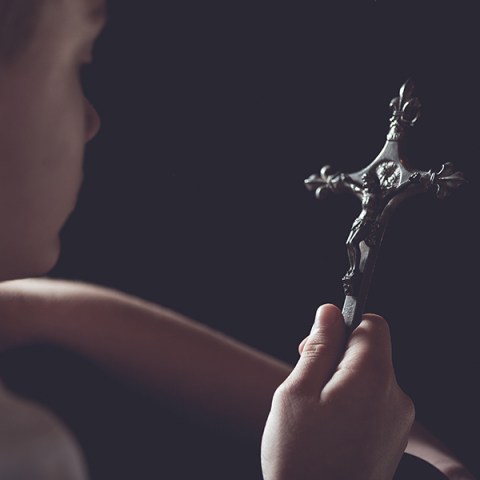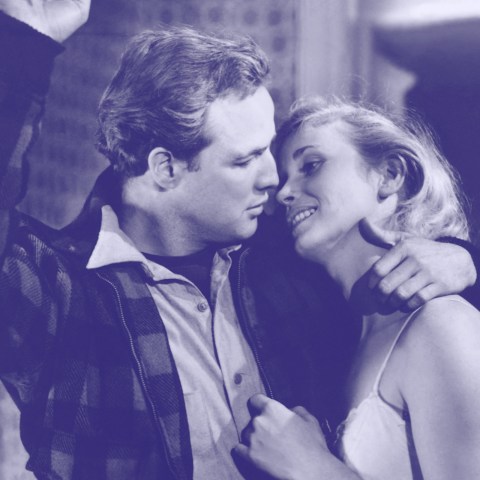I probably learned more Catholic doctrine at my evangelical college than I did in twelve years of Catholic schools, but the Catholic schools did introduce me to the Mass – and I was hooked.My freshman year at Wheaton College – immersed in a vibrant evangelical Christian community – I found myself with a surprising desire: to go to Mass. While I was still firmly in the evangelical camp and far from thinking that I needed to become Catholic, the desire was very clear.
I didn't know about the parish in Wheaton yet, and I didn't have a car anyway. But I did know about St Peter’s in the Loop, a Catholic church in Chicago close to the train station. I suspect almost every single Wheaton College student of the last few years has walked by St Peter’s: it’s right on Madison Avenue in downtown Chicago between the Ogilvie train station and Millennium Park. When I noticed it on one of my first trips to Chicago, right away I drew inspiration from its massive stone crucifix outside. It always seemed to me to be a great spiritual bulwark, a sign that Jesus was present right there in downtown Chicago.
Combined with the fact that they offered Mass on Sunday evenings (I still went to a Protestant church Sunday mornings), it seemed like the easiest way for me to go to Mass. So every few months, usually by myself, I hopped on the train into Chicago and caught Sunday evening Mass at St Peter’s in the Loop.
But why in the world did I want to go to Mass? The explanation goes back to when I was just starting grade school.
My Protestant parents had become increasingly dissatisfied with the local public schools that my older siblings had attended, and decided to send my younger brother and me to local Catholic schools from 1st through 12th grade. And although I’m sure my parents didn’t think about it or its possible implications, this meant that I would attend Mass regularly for years.
Both the K-8 school and the high school I attended had a school-wide Mass once a month, which meant about eight Masses per year. Eight multiplied by the twelve years of school comes to 96 Masses. The high school offered optional Mass on Friday mornings during Lent, and since I played the piano for the school’s Mass music team, I also attended those Masses, which adds another 24 Masses or so. The summer before my senior year of high school, I was invited to play the piano for a local parish’s LifeTeen music team, which I did during my senior year of high school, adding about 50 more Masses that year. Add in a handful more for a few weddings, funerals, retreats, etc., and I think a good estimate of the number of Masses I attended before going to Wheaton College is 180.
180 Masses represents a little more than three years of Sunday and Holy Day of Obligation Mass attendance. All of that was spread over 12 years, with my Mass attendance becoming much more frequent later in high school.
The reason I was attending Mass at all growing up was either directly or indirectly related to my attendance of the Catholic schools. I never just went to Mass on Sundays for the fun of it: I wasn’t Catholic, so why would I? The only church services that I went to for the purpose of spiritual nourishment (maybe some social reasons were mixed in there, too; I did enjoy the people there after all) were Protestant. This meant that once I left Oregon for Wheaton College in Illinois, I no longer had an extrinsic reason to go to Mass.
And it was in removing Mass entirely from my life that just how important it had become to me was made clear. I had been unaware of it for 12 years, but Mass had actually become a very meaningful part of my life that, once gone, was missed.
But so what? So I went to Mass growing up and found myself wanting to go to Mass as an adult. Sounds like Proverbs 22.6 à la first-time-away-from-home college nostalgia for my childhood. But remember, while I went to about three years worth of normal Mass attendance spread over twelve years (with a good chunk of that in my last year of high school), I was going to Protestant church services every single Sunday from birth onwards. Coupled with my high involvement in my family’s Protestant church’s high school youth group (which meant not only Sunday mornings but Wednesday evenings and other events), I went to far and away many more Protestant worship services than Mass. I also explicitly rejected major Catholic teachings at this time, including the real presence of Jesus in the Eucharist.
So given my upbringing, and with all the opportunities given at Wheaton College throughout the week in addition to Sunday mornings, why did I feel like I was missing something?
Let’s face it: contemporary evangelical worship is pretty thin, and I knew from experience that there was something better out there. I had tasted and seen, and couldn’t pretend that I hadn’t. I think most evangelicals don't really know what else there could be. Most evangelicals sing some songs and hear a sermon; that’s all fine and good, and both have their place in the Mass, but there’s nothing transcendent, mystical, or honestly even really that prayerful about it. This is, of course, a broad generalization, and yes, there might be some praying, but its not the same kind of prayer that is the Mass. In most contemporary evangelical worship, silence is avoided; there’s nothing like the Confiteor, Kyrie, Sanctus, or the Gloria; heck, most evangelical worship services don’t even include the Lord’s Prayer, let alone the Lord’s Supper.
When I was only going to contemporary worship services, I longed for the depth of the Mass. I didn’t understand most of it (and I’m confident that I still don’t), but I knew enough to know that the Mass was saturated with deep spiritual meaning. That’s what’s so great about the Mass: it’s so full and rich with meaning that one can dig one's whole life into it without ever getting to the bottom of it. This is because the Mass contains, expresses, even re-presents the deepest mysteries of our faith. Its repetition is not boring, but grounding. And I mean more than just providing comfort through the familiar: in praying the Mass over and over again, one wades further and further into the deepest truths of the faith.
Not all evangelicals have adopted the contemporary worship style, but most have. The churches I’ve gone to that haven’t are perhaps somewhat better, but have just made up a liturgy relatively recently that doesn't have anything close to the deep meaning or roots of the Mass. I did attend an Anglican church for a few months in college, which was somewhat refreshing since much of it was verbatim the same as the Mass; but it seemed that we were only pretending: if I was going to be worshiping like that, I might as well go back to the source: the Catholic Church.
Most evangelicals have never gone to Mass, and if they have, maybe only a few times. In addition to seeming very foreign and strange, they probably had one or both of the following reactions:
First, it probably seemed spiritually dead. This was probably partly because many of the Catholics next to them in the pews were spiritually dead (as you’ll find anywhere), but I think part of it is also because many evangelicals have been taught to associate emotion and visible passion with a real encounter with God, which they won’t usually see at a Mass. By the time I was in college I had gone to enough Masses – and without prejudice, since I had gone from the early days of my youth, to know that that wasn’t the case, and that in fact, the Mass was beautifully rich with meaning, and perhaps even more spiritually alive than contemporary worship.
Second, they probably thought, “This isn’t for me.” They didn’t “get it” right away, and so they just want to move on. I think this may be the case because evangelical worship tends – nay, is now specifically designed – to be the type of thing that someone can “get” right away. That’s the opposite of the Mass, and thank heavens it cannot be comprehended so quickly. One cannot just “get” God, Jesus, or the Bible; and one cannot “get” the Mass right away precisely because it is the full expression of the Christian faith – something that is indeed alien to the world. One must be drawn into it and be reshaped, perhaps slowly. Instead of being a form of worship conformed to our culture, the Mass conforms and reorients us, and for the rest of our lives. In other words, if Mass makes you feel uncomfortable, bored, or impatient, maybe that reflects more on you than on the Mass, which might mean that the Mass is exactly where you need to be.
I probably learned more Catholic doctrine while at Wheaton College than I did in twelve years of Catholic school. But it was during my time in Catholic schools that I was drawn into the mysterious, life-changing world of the Mass – and was left with an experience that I just couldn’t shake. The Mass kept me spiritually linked to the Catholic Church while I tried to sort out doctrinal and historical truth claims. And when I finally received the Body and Blood of our Lord, after sixteen years of going down the communion line with arms crossed on my chest for a blessing, I knew that I was finally home.








